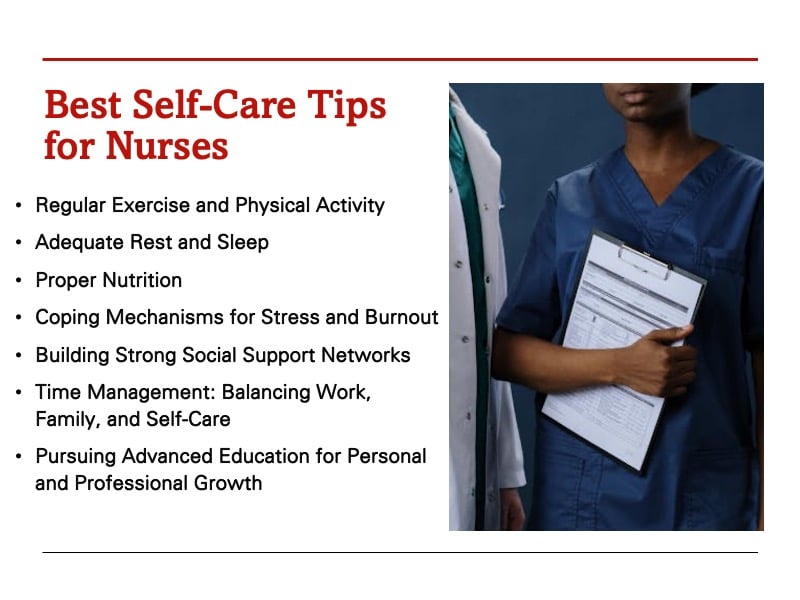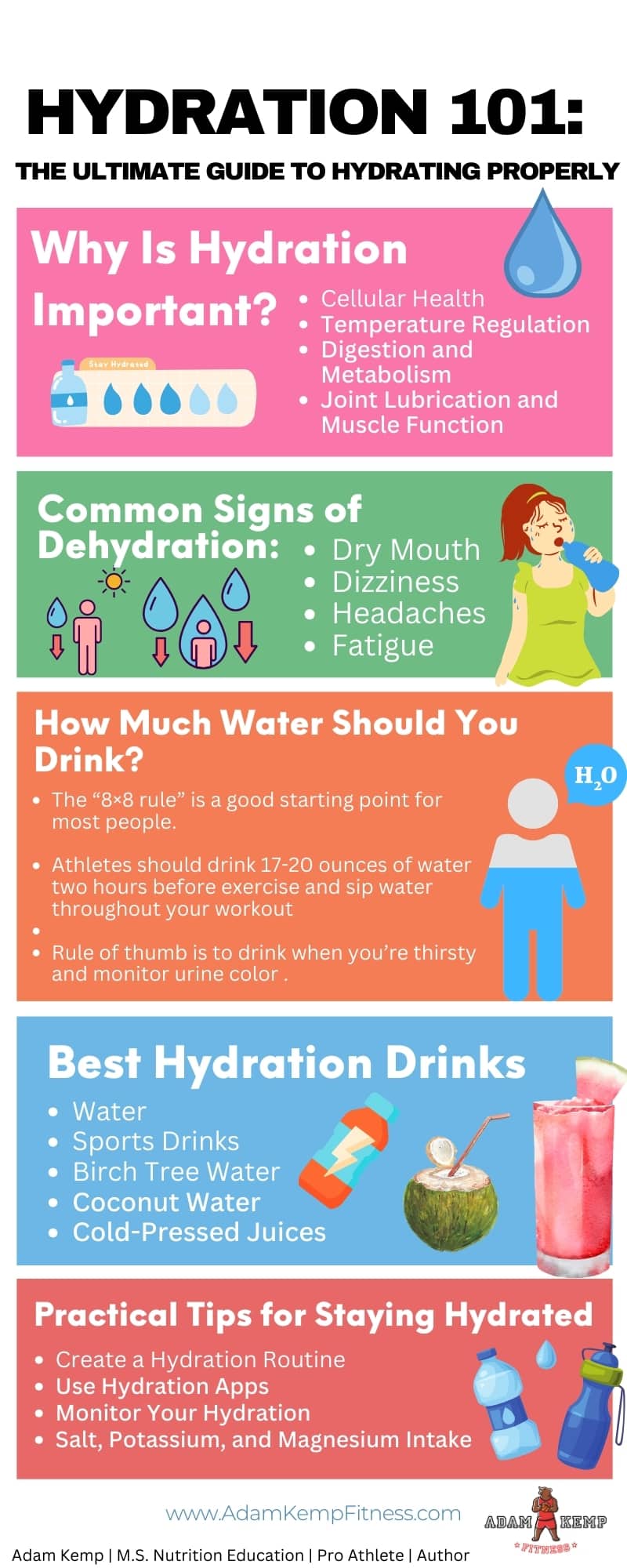Self-Care for Nurses: How Nurses Can Improve Their Mental and Physical Well-Being
Self-care for nurses is not just a luxury, it’s a necessity for sustaining both personal health and professional excellence.
Nurses are consistently ranked among the most trusted and hardworking professionals, but this trust comes at a cost.
According to a 2021 study, more than 60% of nurses report symptoms of burnout, with many experiencing emotional exhaustion, sleep disturbances, and even physical illness as a result of their work conditions (Shah et al, 2021).
This level of strain affects not only their well-being but also patient outcomes and job satisfaction.
Drawing from my years as a professional athlete and health educator, I understand the physical and emotional toll that a high-performance environment can have on the body and mind.
Just as elite athletes must prioritize recovery, mental resilience, and self-maintenance to remain effective and fulfilled in their roles, nurses also need to do so.
This guide is designed to provide practical, evidence-based strategies for nurses to incorporate self-care into their daily lives, enabling them to continue caring for others while also taking care of themselves.
Promoting self-care for nurses is one of the most impactful ways to support overall well-being, reduce burnout, and ensure long-term success in the profession.
Why is Self-Care Important for Nurses?
Self-care is important for nurses because it directly impacts their ability to provide safe, effective, and compassionate care to others while preserving their own health, longevity, and job satisfaction.
Nurses often operate in high-stress environments where emotional intensity, physical demands, and irregular hours are the norm.
Without intentional self-care practices, this chronic strain can lead to burnout, anxiety, depression, musculoskeletal injuries, and even compassion fatigue.
These conditions not only harm the nurse personally but can also compromise patient safety and the overall quality of care.
Prioritizing self-care for nurses supports:
- Prevent Burnout and Fatigue: Regular rest, recovery, and stress-reduction techniques can reduce emotional exhaustion and increase mental clarity.
- Improve Physical Health: Exercise, nutrition, hydration, and sleep help combat the toll of long shifts and physical labor, preventing injury and illness.
- Maintain Emotional Resilience: Mindfulness, therapy, and strong support systems can help nurses process grief, trauma, or overwhelming patient loads.
- Enhance Job Performance: A healthy, focused nurse is better equipped to make decisions, communicate effectively, and respond to emergencies.
- Sustain Long-Term Career Satisfaction: Self-care builds a foundation for a sustainable nursing career by promoting personal fulfillment and professional growth.
Ultimately, self-care for nurses isn’t selfish, it’s an essential part of ethical, high-quality nursing practice.
The healthier and more balanced a nurse is, the better they can support their patients, colleagues, and themselves.
Physical Demands of Nursing
The nursing profession is associated with significant physical demands.
Long shifts that require nurses to be on their feet for hours, lifting patients, managing equipment, and responding to emergencies can take a serious toll on the body.
The repetitive nature of these tasks often leads to back pain, joint discomfort, and fatigue.
Without proper care, these physical challenges can worsen over time, resulting in long-term health issues.
It is crucial for nurses to be mindful of their physical well-being and to incorporate physical wellness strategies to manage stress.
Simple practices, such as stretching, staying hydrated, and using self-massage tools, can help alleviate some of the strain associated with the job.
Mental and Emotional Demands of Nursing
Nursing requires far more than clinical skill, it demands emotional strength, mental flexibility, and unwavering empathy on a daily basis.
Nurses often serve as the emotional anchor for patients and families during some of life’s most vulnerable moments.
Managing pain, grief, trauma, and uncertainty while remaining calm and compassionate takes a significant mental and emotional toll.
Over time, this can lead to compassion fatigue, emotional exhaustion, and even secondary traumatic stress.
Additionally, the constant need for critical thinking under pressure, such as making split-second decisions, managing multiple priorities, and responding to emergencies, can leave nurses mentally drained.
Without appropriate outlets for emotional processing and stress relief, these demands can become overwhelming.
Supporting mental and emotional well-being through mindfulness, peer support, therapy, or creative outlets is essential.
Nurses who care for their own minds and emotions build resilience and preserve their ability to connect meaningfully with those in their care.
Best Self-Care Tips for Nurses

To stay resilient in the face of long hours, emotional demands, and physical exhaustion, nurses need realistic and actionable self-care strategies.
The best self-care tips for nurses are simple enough to implement during even the busiest shifts, yet powerful enough to make a lasting impact on their health and well-being.
Whether you’re a new nurse adjusting to the profession or a seasoned RN looking to restore balance, these strategies are designed to support both your personal and professional life, without adding extra stress.
Pursuing Advanced Education for Personal and Professional Growth
Pursuing advanced education can greatly benefit nurses both personally and professionally.
For example, RN to MSN bridge programs enable nurses to expand their knowledge, explore new opportunities, and enhance their approach to achieving a work-life balance.
With a focus on leadership, clinical expertise, and communication, these programs provide a flexible and comprehensive pathway for nurses to advance in their careers.
They are designed to accommodate busy professionals, allowing nurses to study at their own pace and integrate learning with their day-to-day responsibilities.
The skills gained through such programs improve clinical abilities and teach nurses how to better manage their time, stress, and overall workload.
Related Reading: How to Stay Healthy in Nursing School
Regular Exercise and Physical Activity
Physical activity is essential to counteract the physical demands of a nurse’s job. Regular exercise can significantly reduce stress levels, improve mood, and prevent chronic conditions that can arise from prolonged physical strain.
Activities such as walking, swimming, or doing mobility exercises are ideal for nurses looking to improve their overall health.
Even during shifts, simple stretching exercises and periodic walking can reduce muscle tension and increase energy levels.
Incorporating movement into daily routines is crucial for combating burnout and ensuring the body can meet the physical demands of the profession.
Adequate Rest and Sleep
Sleep is one of the most overlooked aspects of a nurse’s health.
Nurses often work night shifts, long hours, and rotating schedules, all of which can disrupt the body’s natural rhythm.
Adequate rest is essential to recovery and to maintaining both mental and physical health.
Without enough sleep, a nurse’s ability to function effectively decreases, leading to fatigue, irritability, and compromised decision-making.
To combat sleep deprivation, nurses should focus on developing a consistent sleep routine, using blackout curtains to create a restful environment, and limiting caffeine intake in the hours leading up to sleep.
Finding ways to rest and recharge is crucial for longevity in this demanding field.

Proper Nutrition
Good nutrition plays a critical role in maintaining energy levels and overall health.
Nurses often skip meals or rely on unhealthy snacks during their shifts due to time constraints.
However, poor eating habits can lead to fatigue, irritability, and long-term health problems.
Nurses should prioritize meals that are rich in protein, fiber, and healthy fats to keep their energy levels steady throughout the day.
It’s also important to hydrate properly, especially when working long hours or during physically demanding shifts.
Preparing meals in advance and bringing healthy snacks, like fruits, nuts, and granola, can make it easier to stay nourished while on the go.

Coping Mechanisms for Stress and Burnout
Managing stress is one of the most important self-care tips for healthcare workers, including nurses.
Stress is a significant part of a nurse’s life, and without proper coping mechanisms, it can quickly lead to burnout.
The demands of the job, combined with emotional stress from patient care, can weigh heavily on nurses.
It’s crucial to recognize the early signs of stress, such as irritability, fatigue, or feeling overwhelmed.
To manage stress effectively, nurses can turn to strategies such as mindfulness exercises, breathing techniques, prayer, or journaling to release pent-up emotions.
Regular breaks during shifts can also help reset mentally and physically.
Nurses should also be encouraged to seek help when needed, whether through therapy, peer support groups, or professional resources offered by employers.
Being proactive about managing stress helps prevent burnout and keeps nurses mentally refreshed and emotionally healthy.
Building Strong Social Support Networks
Having a strong support system is essential for nurses to cope with the emotional and physical challenges of the profession.
Building relationships with colleagues who understand the demands of the job can provide emotional support and create a sense of camaraderie.
Sharing experiences and seeking advice from peers who have faced similar challenges can be incredibly valuable.
Nurses should also maintain personal relationships outside of work to ensure they have a well-rounded support network.
Whether through family, friends, or mentorship programs, having people to talk to and lean on can help reduce stress and provide reassurance during difficult times.
Time Management: Balancing Work, Family, and Self-Care
Nurses often juggle multiple responsibilities, from taking care of patients to managing family obligations and personal commitments.
Effective time management is key to maintaining balance and preventing burnout.
Nurses should prioritize their tasks, delegate when possible, and make time for self-care, even if it means taking a few minutes each day to relax or engage in a personal hobby.
Setting boundaries between work and personal life is important to avoid becoming overwhelmed.
Additionally, nurses should learn to say no when their plate is too full, ensuring they can focus on what’s most important.
Time management skills can help nurses maintain a healthy work-life balance, making it easier to care for themselves and others.
Final Thoughts: Why Self-Care for Nurses Matters More Than Ever
Self-care for nurses isn’t a trend, it’s a professional imperative and a personal lifeline.
In a career built on serving others, it’s easy for nurses to overlook their own needs.
But without adequate rest, nourishment, emotional support, and recovery, even the most passionate caregivers can burn out.
Prioritizing self-care means acknowledging that your health is just as important as the health of your patients.
It allows you to show up mentally sharp, emotionally grounded, and physically strong.
By integrating even a few intentional self-care practices into daily routines, nurses can protect their longevity in the field and rediscover the joy and meaning in their work.
A healthier nurse is a more effective nurse, and that benefits everyone.
This website does not provide medical advice. This website site does contain affiliate links, and purchases may earn a commission.
Read my Medical Disclaimer, Review Disclaimer, and Publishing Policies for more details. Use of this site indicates acceptance of these terms.



